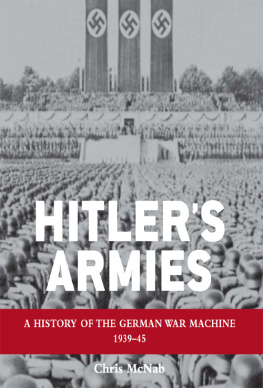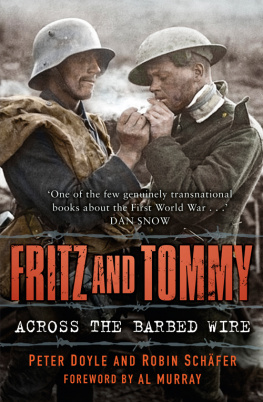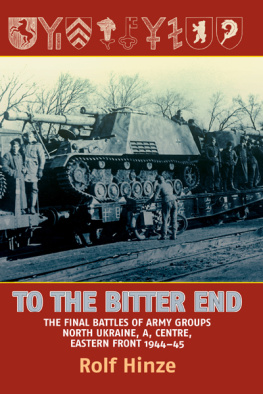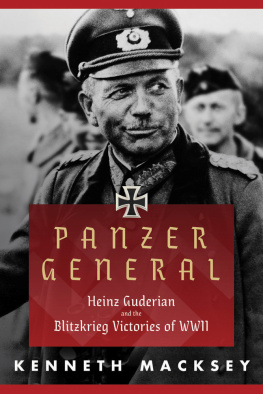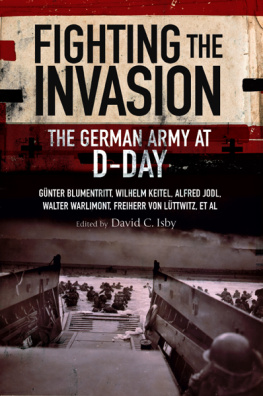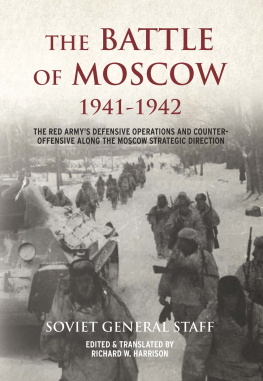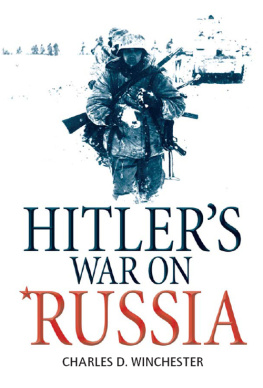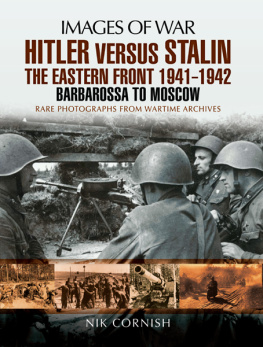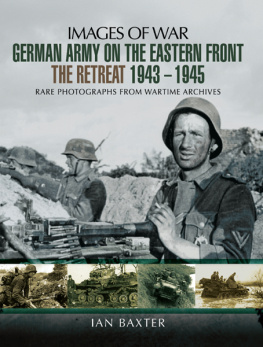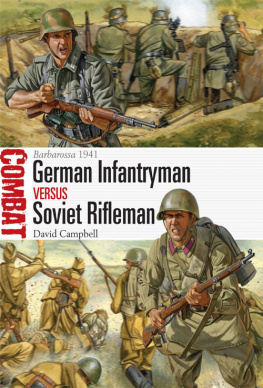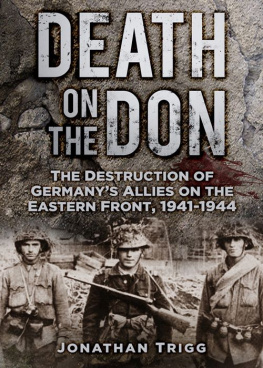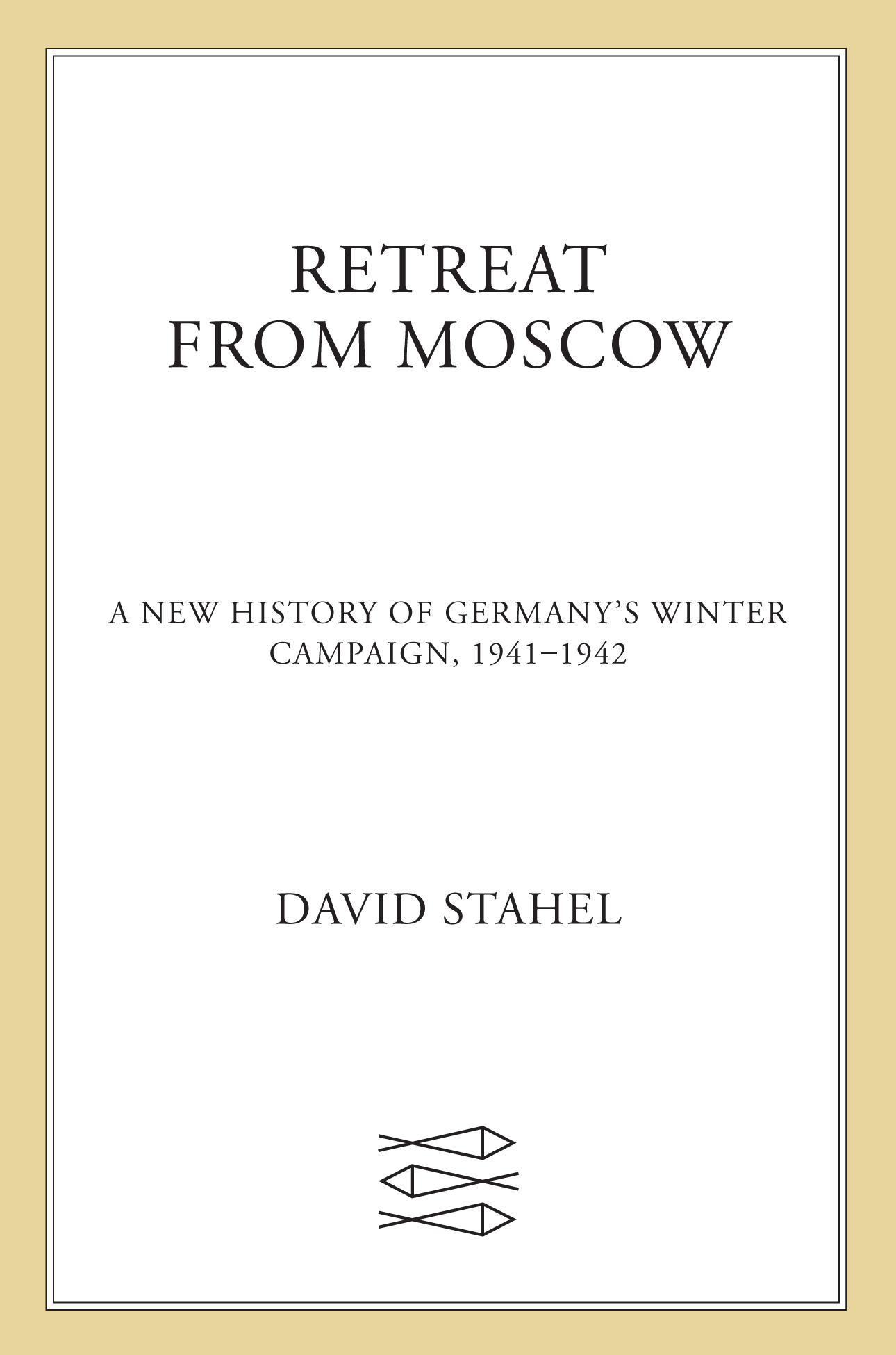The author and publisher have provided this e-book to you for your personal use only. You may not make this e-book publicly available in any way. Copyright infringement is against the law. If you believe the copy of this e-book you are reading infringes on the authors copyright, please notify the publisher at: us.macmillanusa.com/piracy.
Germanys winter campaign of 19411942 has commonly been seen as the first defeat of the Wehrmacht in the Second World War. Indeed, two of the most recent books about the fighting near Moscow by Robert Forczyk (2006) and Michael Jones (2009) both share the subtitle Hitlers First Defeat. Rejecting the accepted view, which saw Stalingrad or Kursk as the classic turning points of Germanys war, Reinhardt was among the first to argue that the battle of Moscow, especially in the winter of 19411942, constituted the decisive event of the war, which represented, as his subtitle claimed, the failure of Hitlers strategy.
For those not familiar with my former studies of German operations in the east, the fighting at Moscow will not be portrayed in this book as Hitlers first defeat, nor even the turning point of the war, because I argue that both already took place in the summer of 1941. Such a proposition may strike some as counterintuitive given that, at the most basic level, the story of Germanys summer campaign is typically characterized by fast-moving panzer groups, calamitous cauldron battles, and staggering sums of Red Army losses. Perhaps even more conclusive is the fact that, at the end of it all, Hitlers armies stood deep inside the Soviet Union, ultimately threatening Leningrad, Moscow, and Sevastopol. The logic here appears simple: Germanys first defeat, whenever that might have been, certainly could not have come before the first winter of the war.
The problem with this logic is that it separates German operations from their strategic context. Battles do not exist in a vacuum, and they should not be seen as ends in themselves. The sheer accumulation of battlefield victories in 1941 clearly did not suffice to knock the Soviet Union out of the war, and it was this failure that ultimately proved so ruinous to Germanys prospects. Heavily restricted access to raw materials, critical production bottlenecks, and bitter policy debates governing the allocation of resources to the armed forces were fundamental to the outcome of a large-scale industrialized war. Indeed, it was Germanys grim long-term economic prospects that first directed Hitlers attention toward an eastern campaign, but embarking on it came with huge risks. Under these circumstances, some authors have attempted to argue Germanys dominance by pointing to the far greater problems in the Red Army during the summer campaign. Yet the contexts for the two forces were entirely different; the Wehrmacht had to win outright at all costs, while the Red Army had only to survive as a force in being.
What made German operations in the course of 1941 so important to the wars ultimate outcome was not just their failure to secure Hitlers all-important victory, but the cost of so many battles to the Wehrmachts panzer groups. In its ruthless pursuit of victory, the German Ostheer (eastern army) became a very blunt instrument, and there was simply no way of reconstituting this offensive power without a very long period of inactivity that the unrelenting warfare in the east would never permit. As the chief of the Army General Staff, Colonel-General Franz Halder, acknowledged in his diary on November 23: An army, like that of June 1941, will henceforth no longer be available to us. Accordingly, the summer and fall of 1941 saw the Wehrmacht achieve stunning successes, but from a strategic point of view it failed to do the one thing that really mattereddefeat the Soviet Union before its vital panzer groups were blunted. Once Operation Barbarossa (the code name for the German invasion of the Soviet Union) passed from being a blitzkrieg to a slogging war of matriel, which was already the case by the end of the summer, large-scale economic deficiencies spelled eventual doom for the Nazi state.
If Germany suffered its first and most significant setback in the summer of 1941, what then is the relevance of studying the 19411942 winter campaign? Is it simply one of the many stepping-stones in the long decline of Nazi Germany or is there something unique about this period? Indeed, if we no longer consider it Germanys first defeat, then what kind of defeat was it? If battles need to be placed in a larger context to ascertain their significance, we should not assume that Germanys winter retreat, any more than its summer advance, is the only indicator of success, or in this case defeat. If the war in the east was, since the end of the first summer, a battle of attrition, then the relative cost of German and Soviet operations determined their worth, and the outcome of any single encounter cannot be decided simply by asking who held the field at the end of the day. In the vast expanses of the east, ground mattered far less than resources, but both the Nazi and Soviet regimes struggled to understand this. Moreover, because of their shared obsession with prestige as well as their grandiloquent ideological worldviews, surrendering ground, even for a tactical/operational advantage, was consistently viewed as defeatist and cowardly. By the same token, offensive operations were consistently pursued by both sides to the detriment of the attacking forces, which were routinely overextended, lacked adequate supply, and became exposed to enemy counterattack.
By the beginning of December 1941 conditions at the front saw both armies suffering frightful shortages and living in desperate conditions across most of the line. Inevitably therefore the strategic calculus for the success of any operation was how much damage it could inflict upon the enemy and, by the same token, what the corresponding cost of that operation would necessitate. With armies stretched, resources typically inadequate, and mobility for most units limited, avoiding wasteful operations was more significant than the alternative of doing nothing at all. Yet for both the German and Soviet high commands there was little appreciation of this. Time and again positions were to be seized or defended at any cost, while success was measured by the acquisition of a set objective and not the sacrifices it entailed. While this remains a by-product of the inexorably ideological nature of the Nazi/Soviet view of war, it should not be accepted as our own standard for determining the value of events. Clearly, the ends did not always justify the means, so we should not simply assume that the most basic indicator of military successseizing ground from the enemywas in every instance vindicated.
In 1941 one of the central problems for the Red Army and the Wehrmacht was the lack of alignment between operational planning and strategic reality. Both sides were attempting far too much and expecting more of their forces than they could ever hope to deliver. During Operation Barbarossa, the Ostheer leadership pursued its advance with an almost obsessive determination, oblivious to the exhaustion of their men and the debilitating matriel losses within their mobile formations. This led directly to the dangerous position the Germans found themselves in near Moscow on December 5 when the first Soviet counterattacks began. Initially the Red Armys offensive capitalized on the overextension of the central part of the German front, where multiple armies, under the direction of Army Group Center, were left dangerously exposed. Soviet success was also aided by the Wehrmachts unpreparedness for the cold, but each new Soviet advance encouraged ever more ambitious thinking until soon Stalin and the


